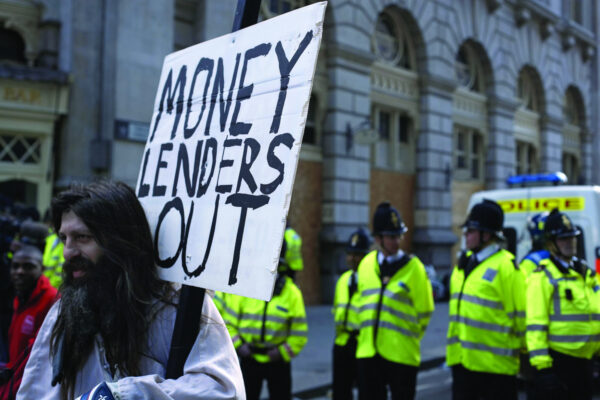Something in the City
Chairman & founder of Capital Economics, Roger Bootle on why London's financial center is the jewel in Britain’s economic crown

By Roger Bootle
October 7 2024
Amidst all the gloom and doom enveloping our country over the last few years, and crisis after crisis, the City of London has continued to perform wonders. Its importance is underplayed in the official statistics, which show the contribution of financial services to the UK’s GDP to be much smaller than you might imagine. It runs at approximately 9%, about the same as manufacturing’s contribution. Within this total, a large proportion consists of domestic financial activities such as pensions and insurance. The contribution to GDP of those financial services that we usually associate with the City is just over 4%. But these figures don’t take into account a whole raft of other services that the City and its offshoots within London provide. Finance merges into many other activities — accountancy, legal services, management consultancy, actuarial services, property agencies — the list goes on and on. Indeed, in business services, not just matters financial, the UK is either first or second in the world and, within the UK, London’s role is dominant. Moreover, the City’s role in the UK goes beyond the bare GDP numbers. It is a huge net export earner for the country. Last year, our trade surplus in financial services amounted to nearly £80 billion, or almost 3% of GDP. Indeed, according to the City of London, our trade surplus in financial services is the largest in the world.
The City is also an enormous contributor of tax revenues to the Treasury. In 2020 (the latest year for which we have figures), it contributed over £75 billion, which is about 10% of all tax revenues. London’s importance is not new. Throughout our history, back even to Roman times, London has been a centre of finance and trade. During the 19th century, London was the epicentre of the world, a place from where Britain played a huge role in parts of the globe that were never formally part of the Empire, including China and Latin America. There was a major financial element to all this. The Gold Standard was run from London and a large part of the world’s financial transactions took place here. Yet, when I was growing up in London in the 1960s, although the City was important, it was a shadow of its former self, and by no means the global success story that we later took for granted. It was sleepy and confined to mostly domestic financial issues. How did this dramatic change come about? The City’s global pre-eminence effectively came to an end with the outbreak of the First World War in 1914. New York had been increasing in importance in the later part of the 19th century and, given the overwhelming size of the United States, it was only a matter of time before it overtook London. The suspension of the gold standard, plus Britain’s economic decline and the breakdown of the international trading system in the 1930s, undermined London’s position, as did the imposition of exchange controls. After the Second World War, London’s global role was further weakened by the gradual end of empire and the eventual eclipse of sterling as an international reserve currency.

The revival of the City occurred under the Thatcher government during the 1980s. There were two major events and several underlying forces. The first event came in 1979 with the abolition of exchange controls. The second was the so-called Big Bang in 1986, which removed restrictions on trading in securities and initiated a surge in takeovers of parochial British stockbrokers and other financial firms by large foreign — mainly American — entities. The result was the ‘Wimbledonisation’ of London’s f inancial markets. That is to say, after not very long, few of the major players were British. Nevertheless, the place was host to the biggest and best in global financial markets. London again returned to being the first- or second-most important financial centre in the world, with only New York as a serious rival.
Even now, although places such as Singapore have increased in importance, London is number one or two in most international financial activities. Overall, the Global Financial Centres Index puts London second in the world (behind New York). The City of London’s own assessment puts us at number one, ahead of New York. Some people argued that when the UK declined to join the euro when it was established in 1999, this would deliver a serious blow to the City. In fact, the opposite happened. On top of all its other business, London thrived as a financial centre doing business in euros. Similarly, 17 years later, many (often the same) people thought that Brexit would undermine the City’s standing by causing a large humber of major players to shift business to the Continent, or even to completely relocate themselves there. In the end, the City has lost comparatively little business. London’s attractions are simply too great. And Brexit has brought some distinct advantages, especially with regard to the UK, rather than Brussels, being able to set our own regulations for the financial sector.
It has helped that, although London has lost some business to Dublin, Amsterdam, Frankfurt and Paris, no single European city has emerged as a dominant player. So, although Britain is outside the EU, London remains Europe’s dominant financial centre. The same Global Financial Centres Index, mentioned earlier, which places London at number two in the world, puts Frankfurt at number 14 and Paris at 15. Despite Brexit, as the BBC might say. What are the secrets of London’s success? In many ways, the answer is to do with its attractions overall, and not simply narrow financial matters. Of course, there is the English language and English law, which remain major attractions, alongside London’s time zone. But London is also an attractive place in which to live. It has always had major cultural attractions and activities that set it apart from its rivals in Europe. But now — and as a child of the Sixties and Seventies, I find it amazing to say this — London has become the gastronomic capital of Europe. I remember when British food was dire and eating out was a choice between Wimpy bars and greasy spoons at one extreme and excessively formal, ultra-expensive, predominantly French, restaurants at the other.

We all know that size isn’t everything, but London does benefit from being big. It dwarfs other European capitals. In fact, in an economic sense it is even bigger because London’s position in the south east and its deep network of transport connections mean that London is at the centre of a population of 20 million or more people, giving a huge local labour force for the City to draw upon. What does the future hold? London will need to develop and evolve, but it is doing so. Fintech, for example, is a growing area of activity and here in London is already playing a pivotal role. Green finance is another promising area. I am therefore optimistic that the traditional skills and characteristics that have made London so successful will continue to deliver
Roger Bootle’s latest book, The AI Economy: Work, Wealth and Welfare in the Robot Age, is out now.
